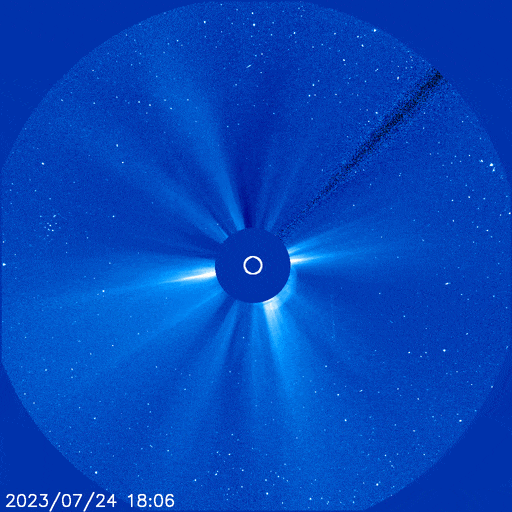July 26, 2023: On July 24th, a bright CME rocketed away from the farside of the sun. Its plane-of-sky speed in SOHO coronagraph images exceeded 1,500 km/s (3.4 million mph):

If this CME had hit Earth, a strong (possibly severe) geomagnetic storm would have surely resulted. Instead, it flew in the opposite direction and hit Europe’s Solar Orbiter (SolO) spacecraft.
The CME reached SolO on July 26th (0200 UT), barely 32 hours after it left the sun. Considering that a typical CME would take two or three days to reach the spacecraft at its current location, a transit of only 32 hours confirms this CME was a fast-mover.
“This was definitely a big event,” says George Ho of the Johns Hopkins Applied Physics Lab, co-principal investigator for the Energetic Particle Detector suite onboard Solar Orbiter. Ho checked the data right after the initial explosion on July 24th and saw a 10,000-fold increase of 50 MeV ions reaching the spacecraft. “This indicates a strong incoming interplanetary shock.”
This plot shows two waves of energetic particles washing over Solar Orbiter:

Above: Data from Solar Orbiter’s EPD/Electron-Proton Telescope (Principal Investigator Javier Pacheco from University of Alcala, Spain)
The first wave (yellow) was accelerated by whatever unseen explosion launched the CME. Traveling close to the speed of light, these particles reached the spacecraft soon after the blast. A second wave (blue) traveled with the CME itself and hit the spacecraft 30+ hours later.
“During the 1989 Quebec blackout, it was this type of shock-driven particle increase during the CME arrival that knocked off the power,” notes Ho.
Launched in Feb. 2020, Solar Orbiter is on a mission to study solar storms at point blank range. Mission accomplished. This storm actually swallowed the spacecraft. Mission scientists will analyze the data from this storm and others to improve future forecasts of space weather. Stay tuned.
This story was brought to you by Spaceweather.com